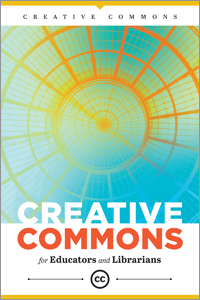Primary tabs
You don't need to be an ALA Member to purchase from the ALA Store, but you'll be asked to create an online account/profile during the checkout to proceed. This Web Account is for both Members and non-Members.
If you are Tax-Exempt, please verify that your account is currently set up as exempt before placing your order, as our new fulfillment center will need current documentation. Learn how to verify here.
- Description
- Table of Contents
- About the author
- Reviews
This book is published under a Creative Commons Attribution 4.0 International license; digital versions are available for download at Creative Commons web page Certificate Resources (CC BY).
The figures are eye-opening: more than 1.6 billion works on 9 million websites are licensed under Creative Commons (CC). These materials constitute an extraordinarily rich repository for teaching, learning, sharing, and creative reuse. Knowing your way around CC will help you make the most of the Open Access (OA) and open educational resources (OER) movements. This book represents the first-ever print complement to the CC Certificate program, providing in-depth coverage of CC licenses, open practices, and the ethos of the Commons. Inside readers will find guidance on
- the layers and elements of CC licenses, with clear explanations on how they interact;
- reusing, revising, and remixing;
- how to acknowledge the underlying work in a remix;
- techniques for locating works in the public domain and communicating their value;
- supporting learners’ access to a wide array of open knowledge resources in primary, secondary, and higher education;
- assessing institutional policies for open education, plus advice on revising these policies;
- ways to adapt existing openly licensed materials in order to keep your institution’s knowledge base relevant and up to date;
- how to meet the open licensing requirements increasingly present in government and foundation grants and contracts; and
- hundreds of authoritative resources for additional learning.
Preface
Acknowledgments
List of Creative Commons Licenses
Chapter 1 What Is Creative Commons?
1.1 The Story of Creative Commons
1.2 Creative Commons Today
1.3 Additional Resources
Chapter 2 Copyright Law
2.1 Copyright Basics
2.2 Global Aspects of Copyright
2.3 The Public Domain
2.4 Exceptions and Limitations of Copyright
2.5 Additional Resources
Chapter 3 Anatomy of a Creative Commons License
3.1 License Design and Terminology
3.2 License Scope
3.3 License Types
3.4 License Enforceability
3.5 Additional Resources
Chapter 4 Using Creative Commons Licenses and Creative Commons-Licensed Works
4.1 Choosing and Applying a CC License
4.2 Things to Consider after CC Licensing
4.3 Finding and Reusing CC-Licensed Works
4.4 Remixing CC-Licensed Works
4.5 Additional Resources
Chapter 5 Creative Commons for Librarians and Educators
5.1 Open Access to Scholarship
5.2 Open Pedagogy and Practices
5.3 OER, Open Textbooks, Open Courses
5.4 Finding, Evaluating, and Adapting Open Resources
5.5 Creating and Sharing OER
5.6 Opening Up Your Institution
5.7 Additional Resources
Index
Creative Commons
Creative Commons is a global nonprofit organization that enables sharing and reuse of creativity and knowledge through the provision of free legal tools. Its legal tools help those who want to encourage reuse of their works by offering them for use under generous, standardized terms; those who want to make creative uses of works; and those who want to benefit from this symbiosis. The vision of CC is to help others realize the full potential of the internet. Learn more at creativecommons.org.
"Creative Commons licenses are a brilliant idea and an excellent fit for academia, where sharing knowledge and receiving credit are far more important than making a profit from one’s work. Hopefully guides like this one will encourage more teachers and researchers to use CC licenses on their works and enable truly efficient knowledge sharing."
— OPEN@VT



